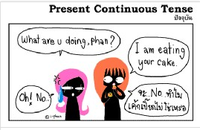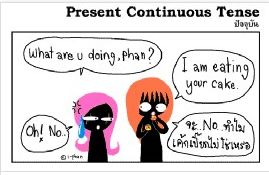簡要介紹
現在進行時除表進行外,還可以表示將來。現在進行時表將來時常用“意圖”“安排”或“打算”的含義。這種現在進行時比較生動,給人一種期待感。
轉移動詞
 現在進行時表將來
現在進行時表將來1、它常表最近或較近的將來,所用動詞多是轉移動詞。如:
(1) I’m going. 我要走了。
(2) I'm coming.我要來了。
(3) When are you starting? 你什麼時候動身?
2、表將來的現在進行時除用於轉移動詞外,亦可用於某些非轉移動詞。如:
(1) I’m meeting you after class. 課後我找你。
(2) What are you doing next Sunday? 下星期你打算乾什麼?
(3) She is buying a new bike soon. 她不久將買一輛新腳踏車。
3、偶爾也表示較遠的將來。如:
When I grow up, I’m joining the army. 我長大了要參軍。
4、表將來的現在進行時有時含有“決心”的意思,多用在否定結構中。如:
(1) I’m not going. 我不走了。
(2) I’m not waiting any longer. 我不再等了。
5、有時也用在肯定結構中。如:
I’m backing out. 我要打退堂鼓了。
6、用這種現在進行時與對方講話時可變成命令,不過語氣比較溫和。如:
(1) You are staying. 你留下吧。
(2) Don’t forget: you are taking part too. 不要忘記:你也要參加。
7、同一般現在時一樣,現在進行時也可在時間、條件或原因狀語從句中表示將來。如:
(1) when you are passing my way, please drop in. 你什麼時候路過我們家,請進來坐。(用於時間狀語從句)
(2) If they are not doing it, what am I to do? 如果他們不乾,那我該怎么辦?(用於條件狀語從句)
(3) She is going to the dentist tomorrow because she is having a tooth filled.
8、表示將來的現在進行時也可用在間接引語中,表示說話人相信它將是事實。如:
He said he is going tomorrow. 他說他明天走。
表將來的現在進行時有時從屬於將來時態。如:
(1) On election night we’ll be telling you what’s happening in various places in this country. 到了選舉的夜晚,我們將把全國各地的情況告訴大家。
(2) when I have time, I’ll come down to the school to see how you’re both doing. 我有空時,會來學校看你們倆的學習情況。
題目
(1)He said he________me a present unless I_______ in doing the experiment.
A. had not given; had not succeeded B. would not give; succeed
C. will not give; succeed D. would not give; will succeed.
答案B. 在時間,條件或讓步主語從句中一般不用將來時。本題有He said,故為過去式。主句用將來時,故選B. 此處用一般過去式代替了過去將來時。
(2) 表示現在已安排好的未來事項,行程等活動。
解答
The museum opens at ten tomorrow. 博物館明天10點開門。(實際上每天如此。)
I know you are arriving next Sunday.(我知道你下個星期天就要到了)
進行時表將來,所以
arriving後面+
next Sunday。
用通俗的方式講,就是:我正在要去做,注意,是去做。

